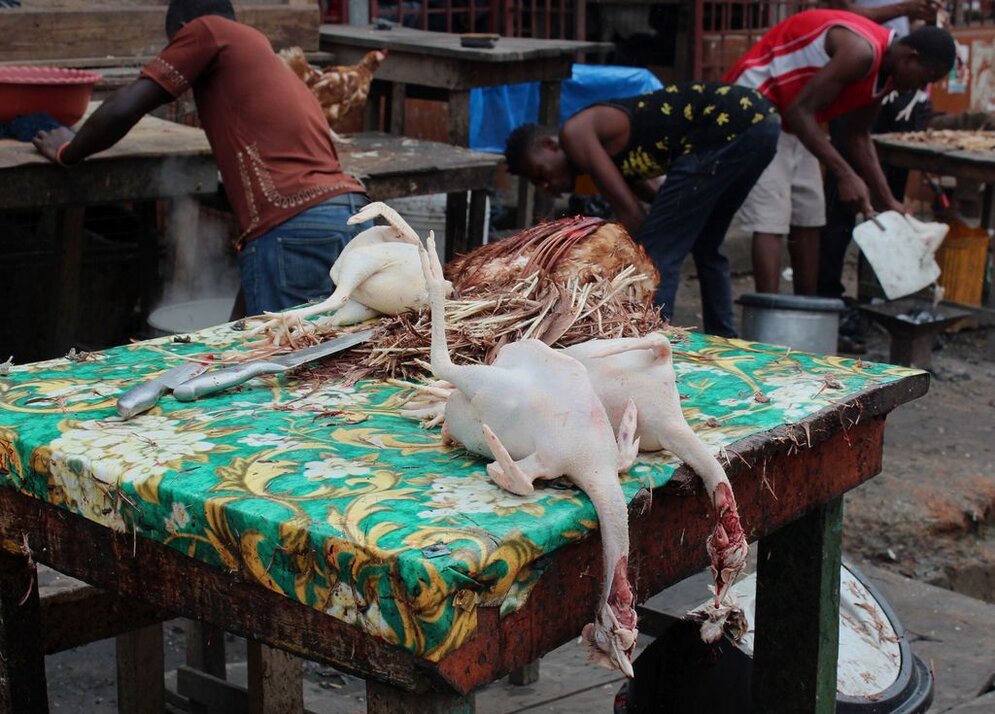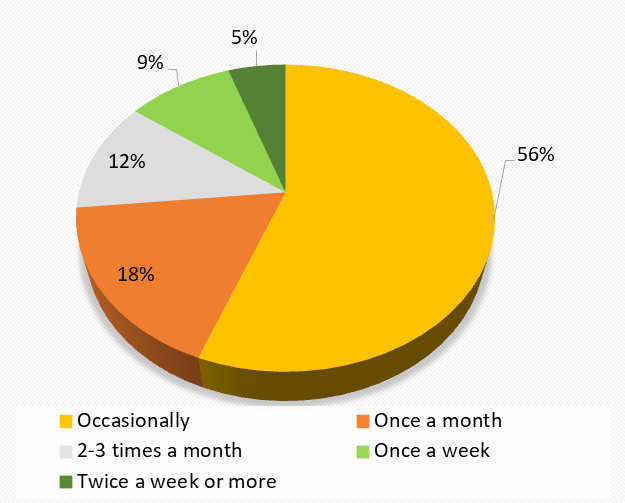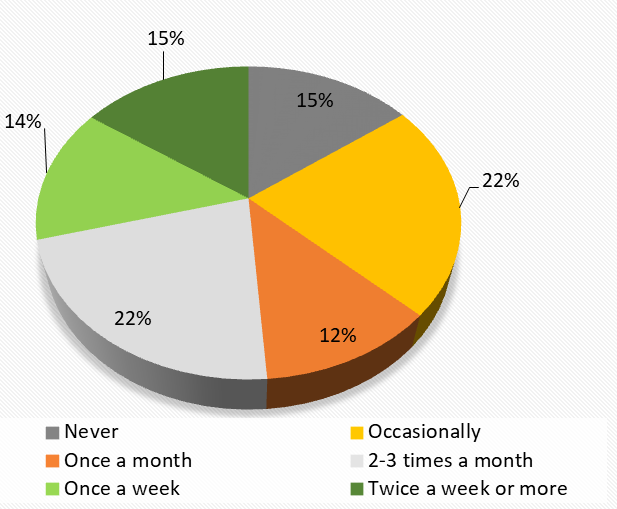Project
Consumers' preferences and demand for poultry meat in Ghana

Preferences for poultry meat in Africa: Analyzing consumer demand for Ghana
Many African countries import large quantities of frozen meat products such as poultry from overseas including the EU. What preferences do consumers have for poultry meat? What impact does it have on local markets in Africa and what role do EU trade policies have? Researchers of the Thünen-Institute of Market Analysis consider those questions for the West African country Ghana.
Background and Objective
Many African countries import large quantities of frozen meat products such as poultry from overseas including the EU. The main destinations of EU chicken exports to Africa are Benin, South Africa, and Ghana. Particularly the parts of slaughtered animals, which are traded, are less often consumed in Western European countries. As this trend is rising, as well as the criticism in discussions about food security, the role of poultry meat products exported by the EU to African countries is becoming an intensively discussed topic. Therefore, we analyze the relevance of poultry trade between EU and Africa and how it affects local markets. One important issue that is rarely addressed regarding imported meat products is the situation on the demand side and especially the impact on individual demand behavior and consumption habits in those developing countries, which import large quantities of meat.
First data analysis reveal that demand for poultry meat has increased strongly – not least because of the population growth and economic development in recent years. Some studies also indicate that imported poultry meat is preferred by African consumers not only because of the prices but also due to its convenience and ready-to-eat attribute. Therefore, researchers at the Thünen-Institute of Market Analysis analyzed consumers’ real preferences and the determinants of poultry meat purchase decisions in Ghana.
Approach
The study targeted chicken consumers who live in urban areas of Ghana as most of the increase in poultry consumption is expected around urban areas. A mixed methods approach is used, which involves the collection of both qualitative and quantitative data in two separate phases.
In the first stage, we collected qualitative data to explore common themes relating to motives, perceptions, attitudes, as well as factors that consumers consider when purchasing chicken meat. Seven focus group discussions were conducted in Accra between August and September 2017, comprising a total of 44 chicken meat consumers.
The second phase involved a quantitative data collection of sampled consumers using face-to-face interviews. The data from the focus groups supported the development of the survey instrument for the quantitative data collection. The face-to-face interviews were carried out in Accra and Kumasi between March and April 2018 by using a random walk procedure. The survey targeted chicken consumers aged 18 and above, and who were at least partly responsible for buying the food or taking decisions concerning food purchases in their homes. In total, 500 respondents (250 from each city) were successfully interviewed.
Our Research Questions
- What motivates consumers to buy chicken meat and how do they perceive domestic and imported chicken meat?
- What is the role of personal factors (i.e., perceptions, attitudes, and sociodemographic characteristics) in influencing consumption patterns of chicken meat in general, and in particular, imported and domestic chicken meat?
- Which quality attributes of chicken are preferred by consumers, and are they willing to pay a price premium for these attributes?
- What are the different sources of information about chicken that consumers use and to what extent do they trust these sources?
Results
Our results tell an interesting story and highlight the importance of chicken meat in the diets of urban consumers in Ghana:
- On the whole, chicken is the second most frequently consumed meat among consumers after fish. Compared to other meat products, consumers prefer chicken because of its taste, affordability, convenience, and versatility (suits many dishes).
- The surveyed households consume imported chicken on a regular base and more frequently than domestic chicken.
- Joint estimation of the consumption patterns of imported and domestic chicken shows that these products could be regarded as (weak) substitutes rather than complements.
- The findings of this analysis also underscore the importance of psychological factors such as perceptions and attitudes in shaping consumers’ choices and consumption behavior. For example, concerns about food safety, price, and the lack of convenience reduce regular domestic chicken consumption, while perceived quality (i.e., freshness and taste) and ethnocentrism increase regular consumption. In terms of imported chicken, the importance of prices, convenience, and availability influence frequent consumption. See also: Imported versus domestic chicken consumption in Ghana: Do attitudes and perceptions matter? Journal of International Food & Agribusiness Marketing, https://doi.org/10.1080/08974438.2020.1751767
- Furthermore, the findings highlight consumers' concerns about the way chickens are produced and rising awareness of food safety among consumers in Ghana.
- Consumers generally prefer domestic to imported chicken and are willing to pay more for domestic chicken meat. However, consumers’ preferences differ in their preferences for the chicken meat attributes across segments. In this contribution (Is there hope for domestically produced poultry meat? A choice experiment of consumers in Ghana. Agribusiness, 36(2), 281–298, https://doi.org/10.1002/agr.21626) four segments are identified.
- Consumers mainly use personal sources (family, friends, and sellers/vendors) and electronic media sources (radio and television) for their purchase of chicken meat. This contribution (Profiling consumers based on information use and trust in a developing economy. International Journal of Consumer Studies, 44(3), 285–295, https://doi.org/10.1111/ijcs.12565) gives more details about the motives for purchasing chicken, the use of information cues, frequency of chicken consumption, and sociodemographic characteristics.
Finally, Collins Asante-Addo presented results of the project at Think Aloud! - GFFA Science Slam in January 2020 in Berlin.
Project brief: Asante-Addo C, Weible D, Pelikan J (2020) Consumers' preferences and demand for poultry meat in Ghana. Braunschweig: Thünen Institute of Market Analysis, 2 p, Project Brief Thünen Inst 2020/16a, DOI:10.3220/PB1592221161000
Thünen-Contact

Involved Thünen-Partners
Funding Body
-
Federal Office for Agriculture and Food (BLE)
(national, öffentlich)
Duration
1.2017 - 7.2020
Publications
- 0
Asante-Addo C, Weible D (2020) "Everybody likes chicken" - a focus group study of consumers in Ghana. Schr Gesellsch Wirtsch Sozialwiss Landbaues 55:241-251
- 1
Asante-Addo C, Weible D, Pelikan J (2020) Consumers' preferences and demand for poultry meat in Ghana. Braunschweig: Thünen Institute of Market Analysis, 2 p, Project Brief Thünen Inst 2020/16a, DOI:10.3220/PB1592221161000
- 2
Asante-Addo C, Weible D (2020) Imported versus domestic chicken consumption in Ghana: Do attitudes and perceptions matter? J Int Food Agribusiness Market 32(5):503-526, DOI:10.1080/08974438.2020.1751767
- 3
Asante-Addo C, Weible D, Pelikan J (2020) Präferenzen der Verbraucher für Geflügelfleisch in Ghana. Braunschweig: Thünen-Institut für Marktanalyse, 2 p, Project Brief Thünen Inst 2020/16, DOI:10.3220/PB1594196155000
- 4
Asante-Addo C, Weible D (2020) Profiling consumers based on information use and trust in a developing economy. Int J Consum Stud 44(3):285-295, DOI:10.1111/ijcs.12565
- 5
Asante-Addo C, Weible D (2019) Is there hope for domestically produced poultry meat? A choice experiment of consumers in Ghana. Agribusiness 36(2):281-298, DOI:10.1002/agr.21626

![[Translate to English:] [Translate to English:]](/media/_processed_/3/e/csm_AdobeStock_249730128_92f14d3a63.jpeg)
![[Translate to English:] [Translate to English:]](/media/_processed_/3/e/csm_AdobeStock_249730128_a6fcf4c893.jpeg)









